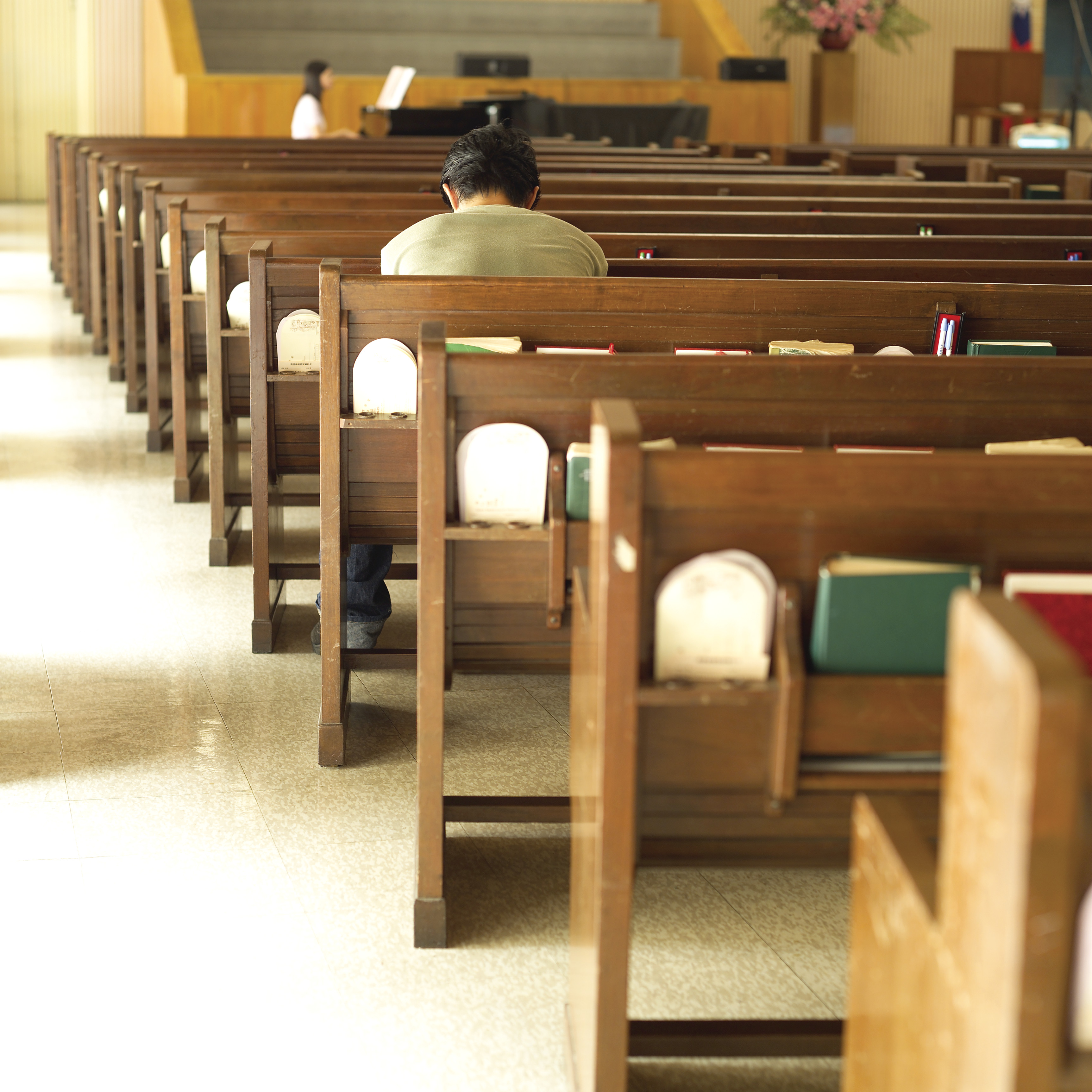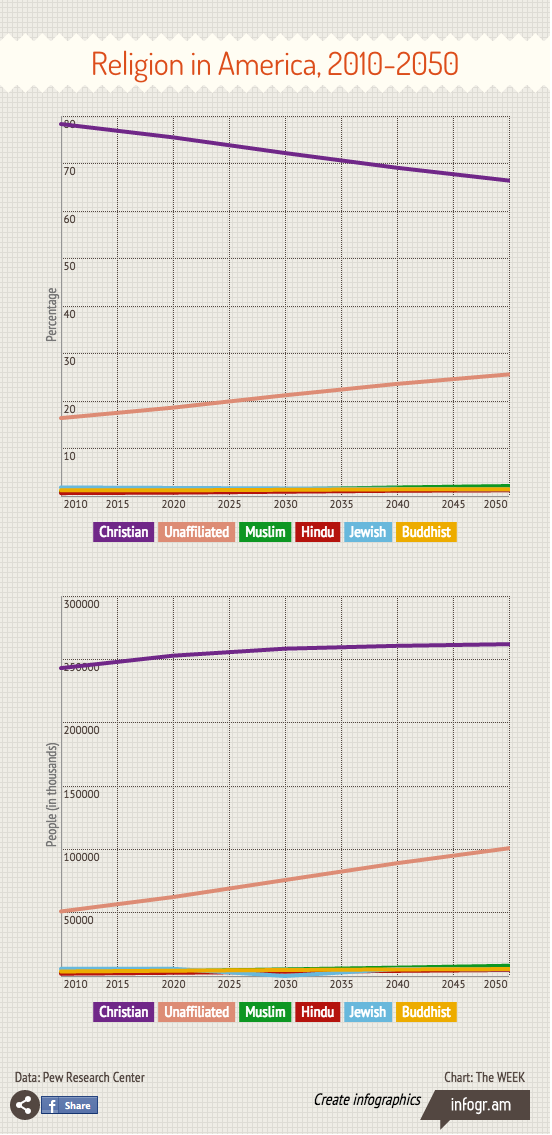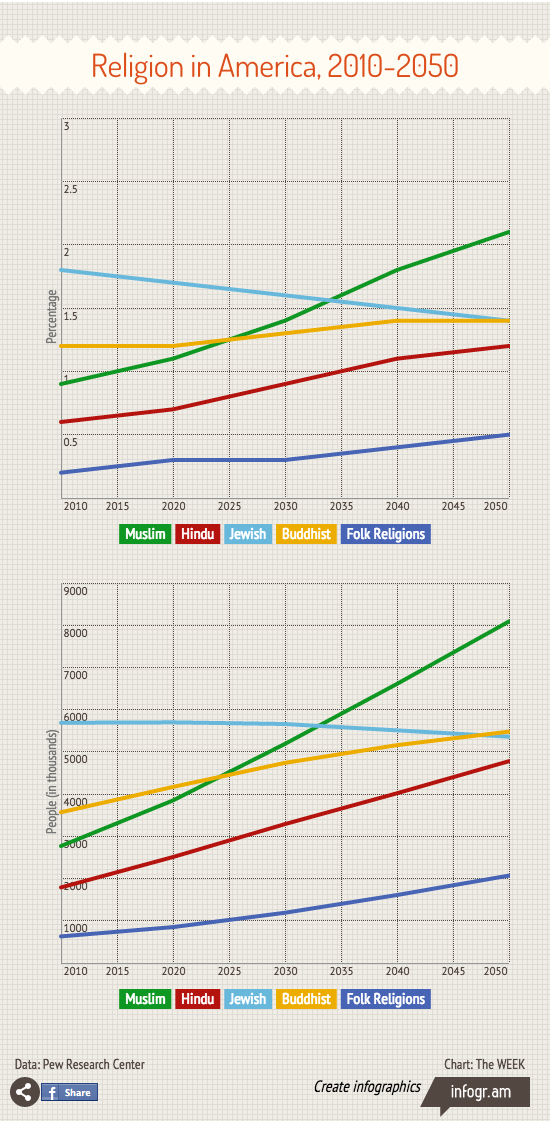America will be less Christian — and much more religiously ambivalent — in 35 years
Part of our series on America in 2050


A free daily email with the biggest news stories of the day – and the best features from TheWeek.com
You are now subscribed
Your newsletter sign-up was successful
Christianity will almost certainly still be the predominant religion in the United States in 35 years, but its place in the firmament of American theism won't be quite as high. Atheism and its cousin agnosticism, on the other hand, are due for a pretty sizable step up, according to projections from the Pew Research Center's Forum on Religion & Public Life.
That may not be very surprising, but the reasons for the shifting demography of American religion are pretty interesting. There will be more Christians in 2050 than today, Pew predicts, and Christians will continue to be more fertile than the religiously unaffiliated, Pew's term for "atheists, agnostics, and people who do not identify with any particular religion." Currently, Christians have a fertility rate of 2.1 children per couple, just at the replacement level, versus 1.6 for the unaffiliated.
But thanks primarily to people switching religions or dropping out, the percentage of the U.S. that identifies as Christian will decline to 66.4 percent in 2050, from 78.3 percent. Meanwhile, the religiously unaffiliated population will increase to 25.6 percent, from 16.4 percent.
The Week
Escape your echo chamber. Get the facts behind the news, plus analysis from multiple perspectives.

Sign up for The Week's Free Newsletters
From our morning news briefing to a weekly Good News Newsletter, get the best of The Week delivered directly to your inbox.
From our morning news briefing to a weekly Good News Newsletter, get the best of The Week delivered directly to your inbox.
Numerically, the Christian population will rise slowly then flatten, adding a total of about 19,000,000 adherents between 2010 and 2050. The ranks of the religiously unaffiliated will nearly double, growing by nearly 50,000,000. Here's what that looks like in a chart:

It's worth noting that most of the unaffiliated aren't atheist or even agnostic, according to a 2012 report by Pew and PBS. In that survey, 13.9 percent identified as "nothing in particular," versus 3.3 percent who called themselves agnostic and 2.4 percent who self-identified as atheist. And two-thirds of the religiously unaffiliated said they believe in God.
Nonetheless, the shift away from Christianity toward "nothing in particular" has significant implications for how America lives, gives, and votes, among other things. A December 2013 Gallup poll, for example, found that more Christians (84 percent) say they give money to charity than people with no religion (77 percent).
Politically, the rise of the "nones" could spell trouble for the Republican Party. There's been a lot of discussion about how the growing Hispanic population — projected by the U.S. Census Bureau to increase by 86 percent between 2015 and 2050, to 112 million, or about 28 percent of the U.S. populace — will help Democrats (unless Republicans make inroads with Latinos).
A free daily email with the biggest news stories of the day – and the best features from TheWeek.com
But the religiously nonaffiliated also skew to the left. Pew's 2012 study found that 63 percent of the "nones" identified as Democratic or leaning toward the Democratic Party, and they were roughly twice as likely to call themselves liberal as conservative. If the religiously unaffiliated become a political force, Republicans will either have to capture more of the religious vote or court the religiously noncommittal.
The political party seen as more friendly toward Muslims could benefit from demographic shifts, too, as Islam is projected to be the No. 3 U.S. religion by 2050, passing Judaism both numerically and percentage-wise:

Muslims had the highest U.S. fertility rate in the last five years — 2.7 kids per couple — but Pew's predictions about the surge in Islam, Buddhism, and Hinduism are tied largely to immigration from the Asia-Pacific, Middle East, and North Africa. In fact, in recent years, Asians have made up the the largest slice of immigrants to the United States, according to Census data.
Pew can't read the future, of course, but if its educated guess about the coming demographic shifts is anywhere close to accurate, religion in America will look pretty different in 35 years, in ways big and small. Churches, mosques, synagogues, ashrams, temples, and politicians should all plan accordingly.
Peter has worked as a news and culture writer and editor at The Week since the site's launch in 2008. He covers politics, world affairs, religion and cultural currents. His journalism career began as a copy editor at a financial newswire and has included editorial positions at The New York Times Magazine, Facts on File, and Oregon State University.
-
 Putin’s shadow war
Putin’s shadow warFeature The Kremlin is waging a campaign of sabotage and subversion against Ukraine’s allies in the West
-
 Media: Why did Bezos gut ‘The Washington Post’?
Media: Why did Bezos gut ‘The Washington Post’?Feature Possibilities include to curry favor with Trump or to try to end financial losses
-
 Magazine solutions - February 27, 2026
Magazine solutions - February 27, 2026Puzzle and Quizzes Magazine solutions - February 27, 2026
-
 The billionaires’ wealth tax: a catastrophe for California?
The billionaires’ wealth tax: a catastrophe for California?Talking Point Peter Thiel and Larry Page preparing to change state residency
-
 Bari Weiss’ ‘60 Minutes’ scandal is about more than one report
Bari Weiss’ ‘60 Minutes’ scandal is about more than one reportIN THE SPOTLIGHT By blocking an approved segment on a controversial prison holding US deportees in El Salvador, the editor-in-chief of CBS News has become the main story
-
 Has Zohran Mamdani shown the Democrats how to win again?
Has Zohran Mamdani shown the Democrats how to win again?Today’s Big Question New York City mayoral election touted as victory for left-wing populists but moderate centrist wins elsewhere present more complex path for Democratic Party
-
 Millions turn out for anti-Trump ‘No Kings’ rallies
Millions turn out for anti-Trump ‘No Kings’ ralliesSpeed Read An estimated 7 million people participated, 2 million more than at the first ‘No Kings’ protest in June
-
 Ghislaine Maxwell: angling for a Trump pardon
Ghislaine Maxwell: angling for a Trump pardonTalking Point Convicted sex trafficker's testimony could shed new light on president's links to Jeffrey Epstein
-
 The last words and final moments of 40 presidents
The last words and final moments of 40 presidentsThe Explainer Some are eloquent quotes worthy of the holders of the highest office in the nation, and others... aren't
-
 The JFK files: the truth at last?
The JFK files: the truth at last?In The Spotlight More than 64,000 previously classified documents relating the 1963 assassination of John F. Kennedy have been released by the Trump administration
-
 'Seriously, not literally': how should the world take Donald Trump?
'Seriously, not literally': how should the world take Donald Trump?Today's big question White House rhetoric and reality look likely to become increasingly blurred
